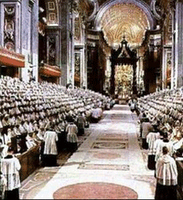Tuesday, September 26, 2006

We continue our close examination of Vatican II's look at religious life in a lightly footnoted section.
The faithful of Christ bind themselves to the three aforesaid counsels either by vows, or by other sacred bonds, which are like vows in their purpose. By such a bond, a person is totally dedicated to God, loved beyond all things. In this way, that person is ordained to the honor and service of God under a new and special title. Indeed through Baptism a person dies to sin and is consecrated to God.
What makes religious life distinct from the baptismal call? Read on:
However, in order that (one) may be capable of deriving more abundant fruit from this baptismal grace, (a person) intends, by the profession of the evangelical counsels in the Church, to free (the) self from those obstacles, which might draw him (or her) away from the fervor of charity and the perfection of divine worship. By (a) profession of the evangelical counsels, then, (she or) he is more intimately consecrated to divine service.(Paulus VI, 1. c., p. S67.) This consecration will be the more perfect, in as much as the indissoluble bond of the union of Christ and His bride, the Church, is represented by firm and more stable bonds.
No problem, right? A permanent commitment gives the freedom of stability, and a certain freedom from second-guessing.
The evangelical counsels which lead to charity (Cfr. S. Thomas, Summa Theol. II-II, q. 184, a. 3 et q. 188, a. 2. S. Bonaventura, Opusc. X, Apologia Pauperum, c. 3, 3: cd. Opera, Quaracchi, t. 8, 1898, p. 245 a.) join their followers to the Church and its mystery in a special way. Since this is so, the spiritual life of these people should then be devoted to the welfare of the whole Church. From this arises their duty of working to implant and strengthen the Kingdom of Christ in souls and to extend that Kingdom to every clime. This duty is to be undertaken to the extent of their capacities and in keeping with the proper type of their own vocation. This can be realized through prayer or active works of the apostolate. It is for this reason that the Church preserves and fosters the special character of her various religious institutes.
The profession of the evangelical counsels, then, appears as a sign which can and ought to attract all the members of the Church to an effective and prompt fulfillment of the duties of their Christian vocation. The people of God have no lasting city here below, but look forward to one that is to come. Since this is so, the religious state, whose purpose is to free its members from earthly cares, more fully manifests to all believers the presence of heavenly goods already possessed here below. Furthermore, it not only witnesses to the fact of a new and eternal life acquired by the redemption of Christ, but it foretells the future resurrection and the glory of the heavenly kingdom. Christ proposed to His disciples this form of life, which He, as the Son of God, accepted in entering this world to do the will of the Father. This same state of life is accurately exemplified and perpetually made present in the Church. The religious state clearly manifests that the Kingdom of God and its needs, in a very special way, are raised above all earthly considerations. Finally it clearly shows all (people) both the unsurpassed breadth of the strength of Christ the King and the infinite power of the Holy Spirit marvelously working in the Church.
And an additional reminder that religious life operates not as part of the hierarchy, but as a culture of inspiration and fortification for the benefit of the entire Church.
Thus, the state which is constituted by the profession of the evangelical counsels, though it is not the hierarchical structure of the Church, nevertheless, undeniably belongs to its life and holiness.
Comments? From any religious out there?